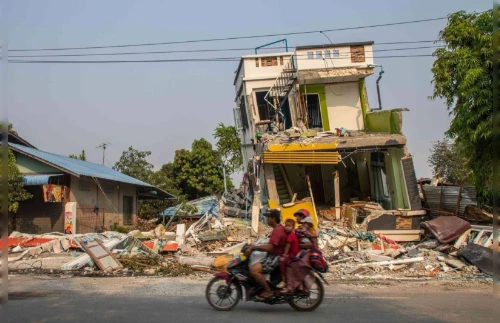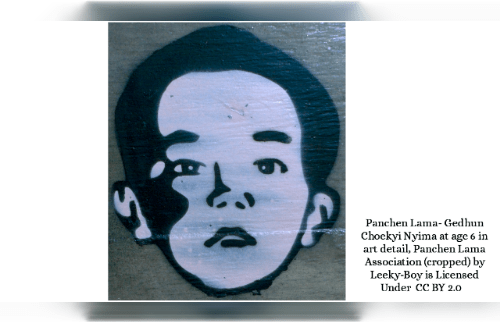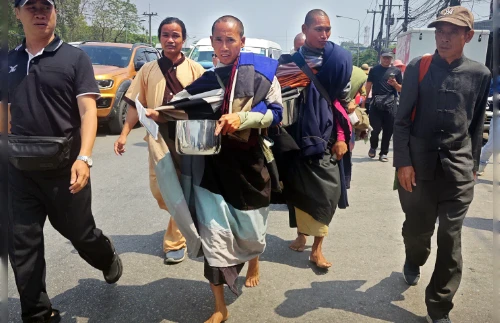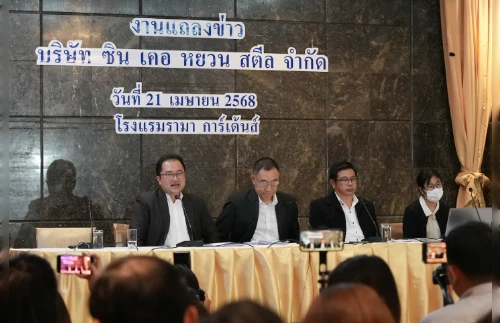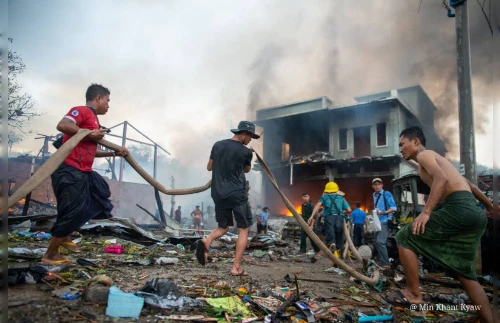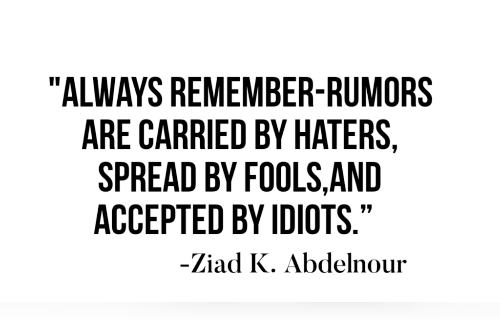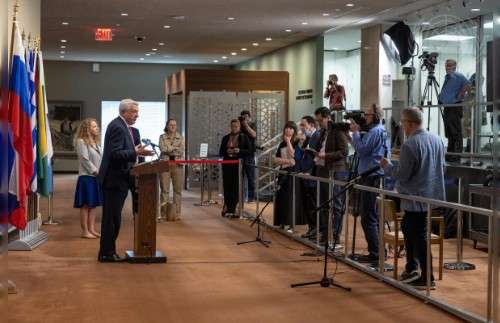Authorities have held Mei Shilin, 27, since soon after he hung the banners at a Chengdu overpass on April 15.
By Qian Lang for RFA Mandarin
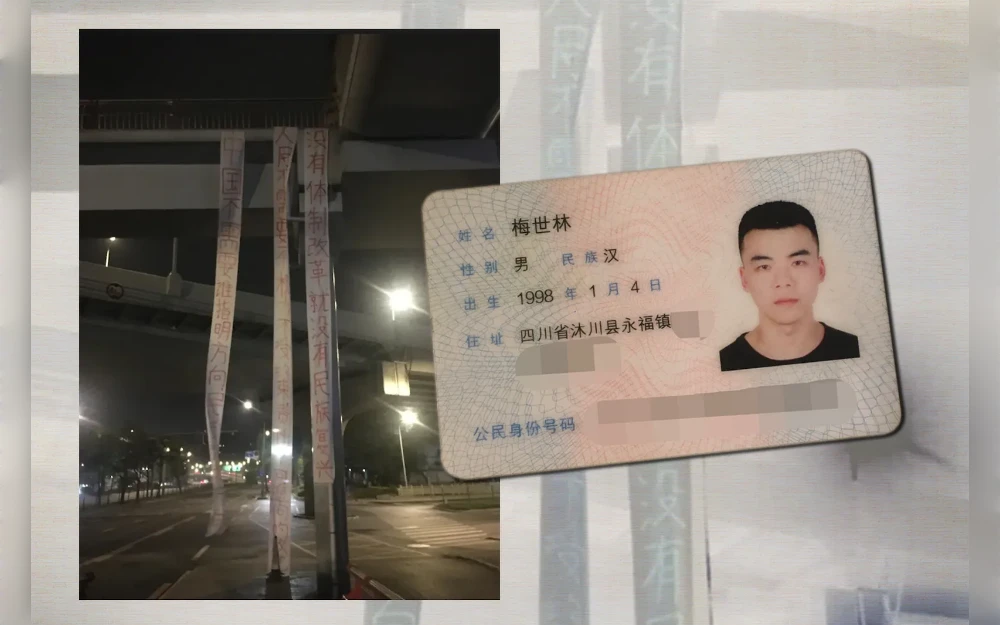
Chinese authorities have detained a young man for unfurling pro-democracy banners this month at an overpass in Chengdu in southwest China – a rare form of public protest that is punishable as a criminal offence, two sources told Radio Free Asia
Authorities are investigating whether Mei Shilin, 27, had any overseas connections and have taken criminal detention measures against him, said the two sources, who spoke on the condition of anonymity fearing reprisals.
The exact date of his detention was not immediately clear, sources said.
In China, criminal detention measures for those suspected of “endangering national security” typically mean being held by police for months until formal charges are filed – formally known as residential surveillance at a designated location. Detainees face constant surveillance, interrogations and may be subject to torture.
The sources said Mei is a resident of Youngfu town in Sichuan province’s Muchuan county and he has been missing for more than 10 days.
Authorities detained him shortly after he was identified as being behind the three banners displayed on a bridge outside Chengdu’s Chadianzi Bus Station on April 15, they said.
The three banners read: “Without political system reform, there will be no national rejuvenation,” “The people do not need a political party with unrestrained power,” and “China does not need anyone to point out the direction, democracy is the direction.”
One of the two sources, Qin from Chengdu, said if Mei was found by investigators to have overseas ties, he would be handed over to the State Security Bureau and transferred to the Municipal State Security Bureau Detention Center.
“If no substantial evidence of collusion with foreign forces is found, he will be handled by the Chengdu police,” added Qin, who wanted to be identified by a single name for safety reasons.
Legal experts believe authorities may charge Mei with “picking quarrels and provoking trouble” – a common criminal accusation in China that authorities level against political, civil, and human rights advocates.
“They (the prosecution) may file a case for the crime of picking quarrels and provoking trouble because they don’t want to give him a more glorious charge, such as inciting subversion of state power or subverting state power,” Lu Chenyuan, a legal expert in China, told RFA.
“They are now more inclined to depoliticize (the Mei Shilin case) and want to reduce its political significance,” added Lu.
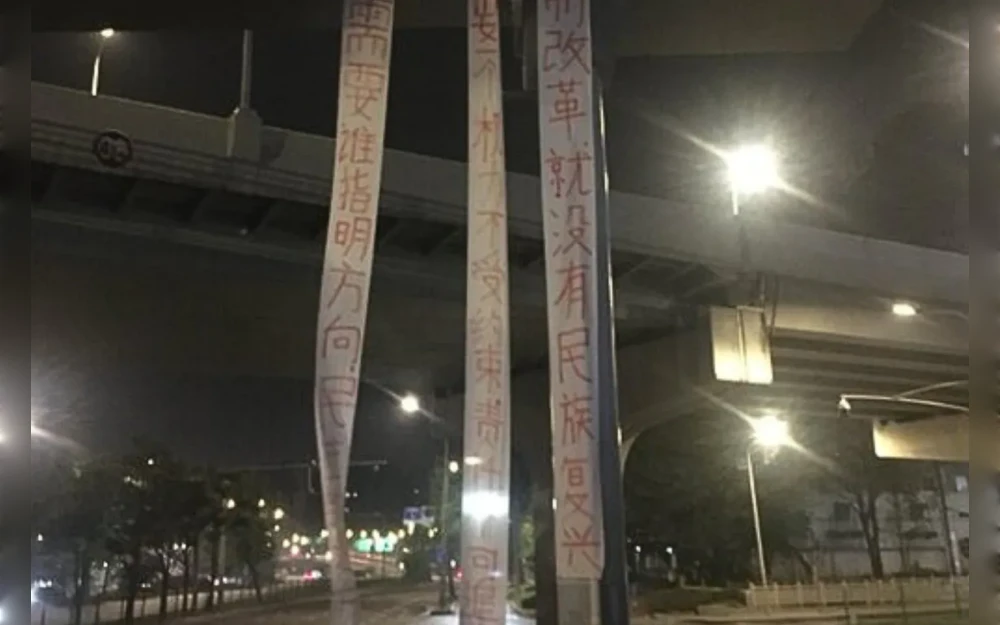
“Peng Lifa of Sichuan”
Still, the incident – that prompted Chinese netizens to hail Mei as “Peng Lifa of Sichuan” – has made authorities very nervous, sources told RFA on Monday.
Peng Lifa, known as “Bridge Man,” had hung similar pro-democracy banners on Beijing’s busy Sitong Bridge, the slogans from which were chanted during the 2022 White Paper protests.
During the White Paper protests, which took place in several cities in China, people showed blank sheets of paper to symbolize that authorities gave them no voice amid anger over the loss of freedom and pandemic lockdowns.
“In the past half month, the Domestic Security Bureau and traffic police in the entire Public Security Bureau system of Chengdu have been highly nervous. They are afraid that another incident would happen, and then the Public Security Bureau Chief will have to quit his job,” said Qin.
The second source in Chengdu, Yang, who also requested to be identified by a single name, confirmed that Mei was detained by the police and that he had previously sought the help of authorities over a labor dispute, but to no avail.
“He (Mei) previously worked in a technology company in Chengdu,” said Yang.
“He (Mei) was treated unfairly in a labor dispute, and when he complained to the government for help, he was ignored. Such things are actually common,” Yang added.
Former Chinese government official and overseas dissident Du Wen and a social media X account “@YesterdayBigcat,” which posts information about protests in China, also confirmed Mei was behind the banners that hung from a bridge near the Chadianzi Third Ring Road Interchange in Chengdu’s Jinniu District.
Du wrote on X that Mei had sent him a 13-second short video, along with photos and a copy of his ID card, on the day of the incident.
Mei also wrote to Du saying he had prepared these slogans for over a year and hoped to have help in spreading the message.
On April 15, a prominent citizen journalist who manages X account @whyyoutouzhele, also known as “Mr. Li is not your teacher,” received a message, similar to the one Du did, along with pictures of the banners, which he posted on the platform in the early morning hours.
By late evening, the same X account confirmed that the man who had shared the information with him had been out of contact for more than 13 hours.
“The last thing he wanted to convey to the public through us was that he hoped democracy could be realized as soon as possible,” Mr. Li wrote in that followup post that same day.
Du said that in his correspondence with Mei he had urged him to leave China but Mei had insisted on staying.
Mei believed that as a Chinese person he has faced unfairness, “and he wants to shout, even if he is torn to pieces,” said Du.
Mei’s display of the pro-democracy banners in Chengdu caused a stir on Chinese social media and posts about the incident were quickly blocked and removed when shared on WeChat.
“With these three huge banners, Mei expressed a demand (for) political system reform … Such emotional expressions have actually been quite common in recent years,” said Yang.
Yang said that the pressure cooker atmosphere in China meant young people were questioning society and expressing dissatisfaction with the political system.
Rights activists and local Chinese sources also said Mei’s protest was a sign of a latent desire for change.
Edited by Tenzin Pema and Mat Pennington.
“Copyright © 1998-2023, RFA.
Used with the permission of Radio Free Asia,
2025 M St. NW, Suite 300, Washington, D.C. 20036.
https://www.rfa.org.”





